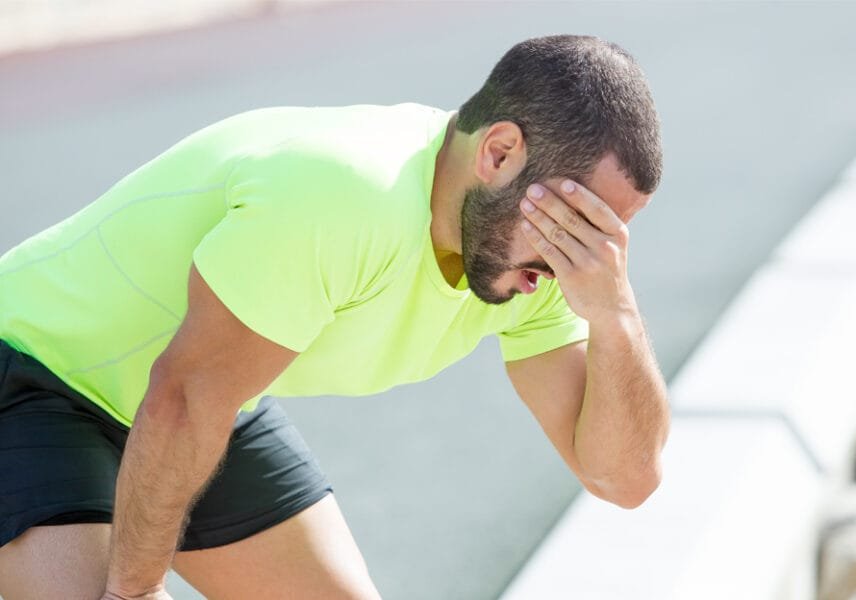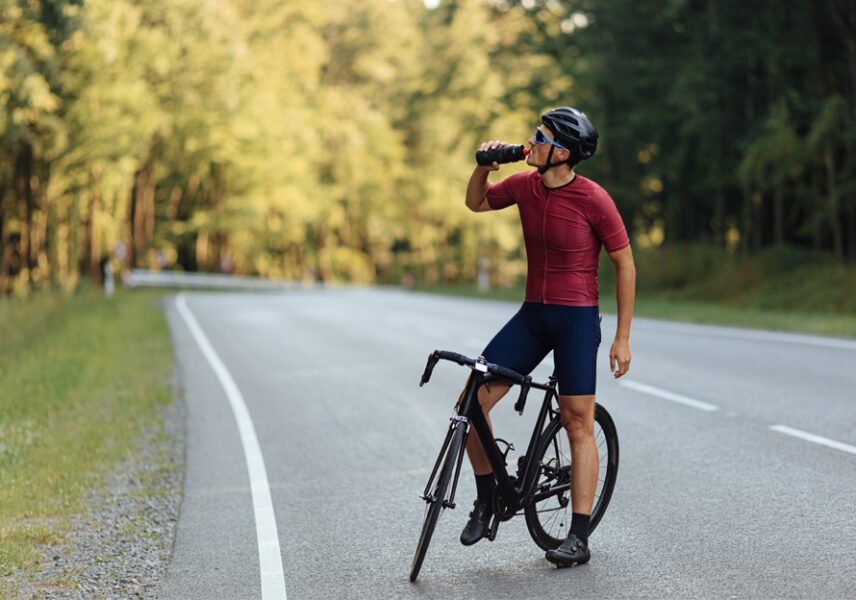Pre-race nutrition and cycling supplements are among the most frequent topics in research by cycling athletes. Race clearly also means the most intense and long training, but let’s remember that it is also and above all our stomach that needs to be trained. Studying the pre-race diet and the integration routine on the pedals is essential to get our digestive system used to it, improve performance and not run into discomfort (or worse) while we are away from home or competing. The athlete’s diet is a concept that is often generalized and trivialized. Certainly the great athletes of the past were content to eat a lot before a race (the Mediterranean diet has a valid basic nutritional intake) to obtain satisfactory performances for the time. The bike is a fantastic story of effort, courage and freedom. Many good results were therefore obtained more thanks to determination than to good preparation. Many things have changed and the average performance has grown exponentially thanks to frames, gear and above all the study of nutrition.
IS THE BIKE THE ONLY CHAIN THAT SET YOU FREE?
Whether it’s uphill, downhill, flat or off-road, no path is closed to you if you travel on two wheels and you can decide to go wherever you let yourself be carried away by your passion and your heart. Whether you prefer the thrill of speed on the road or headlong into the woods on your MTB, cycling is a purely aerobic discipline that allows you to live your passion in the way that best suits you! Alone or in company, on the hardest climbs or in the woods, with willpower alone or with the aid of pedal assistance, it is the only means of transport that makes you feel truly free! Despite being one of the most popular disciplines, the invention of the bicycle is extremely modern: the first pseudo-bicycle took the name of celerifero and was invented by Count Mede de Sivrac in 1790. It had neither steering nor chain, but only push forward movement . In 1839 Kirkpatric Mac Millan, a Scottish blacksmith, inserted a system of pedals and subsequently Michaux in 1855 grafted them onto the front hub of the wheel (about three meters in diameter), building an iron frame and inserting a skate brake on the rear. And here is the first example of a modern bicycle! From then on the legend of the great cycling feats of the 20th century began. Modern cycling has definitely changed compared to the past and there is (MAYBE) little epicness left. We rely more on scientific data with a view to continuous improvement. Our studies on integration fit into this perspective: we have created a line of ad hoc supplements for endurance, in particular for cycling.
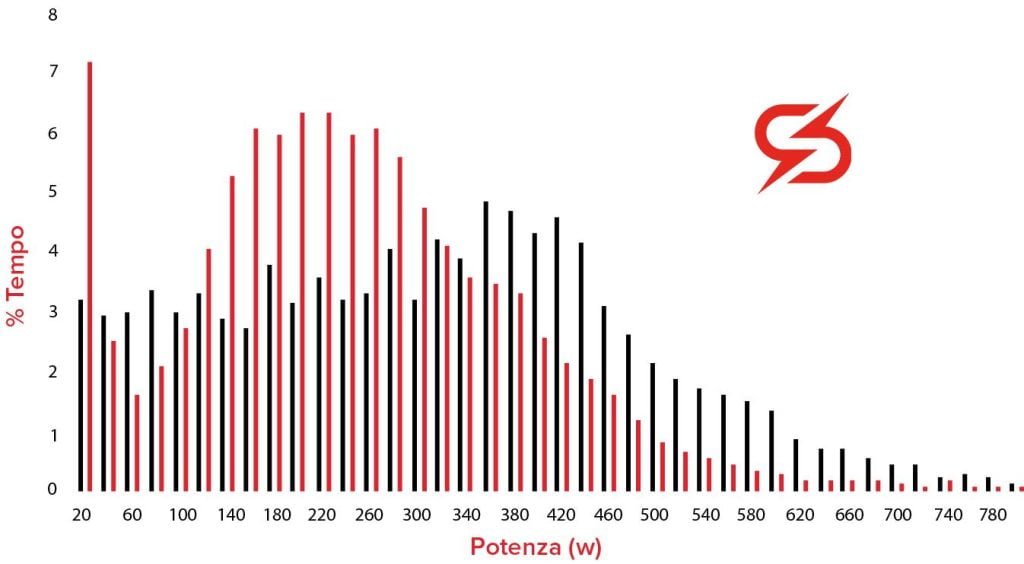
Fig. 1 and 2 Distribution of power output during two individual road races, one of the best 6-hour road races for professionals (■) and one of the best 3.5-hour road races for amateurs (■). Unpublished data obtained from one of the authors (R.D.).
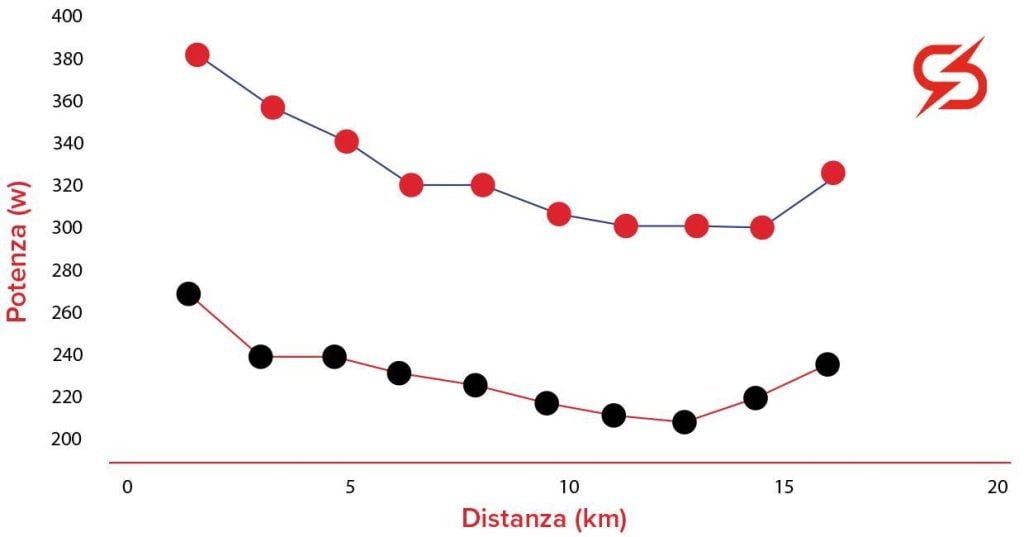
GLYCOGEN RESERVES
The body has only a limited content of carbohydrates (GLICOGEN) in the muscles and liver. Because carbohydrate is the body’s primary source of fuel during high-intensity exercise, muscle fuel stores should be “OVER FILLED” in the 24-36 hours before the event. Depending on the length of the race, a cyclist may need a high carbohydrate diet (increased compared to the previous routine) for 1-2 days before the race or sustained, intensive training. We therefore choose foods low in fiber and rich in carbohydrates (solid or liquid) in the last 12-24 hours before a performance, so as to reduce the risk of gastrointestinal complications. On race day, the final – pre-event – meal should be eaten 3 hours before the start. The foods you choose should be high in carbohydrates and low in fat and fiber to aid digestion and prevent stomach problems. If the athlete is nervous, liquid carbohydrate (e.g., smoothie) is a good choice.
EFFECTS OF CARBOHYDRATE-BASED SUPPLEMENT ON ENDURANCE PERFORMANCE
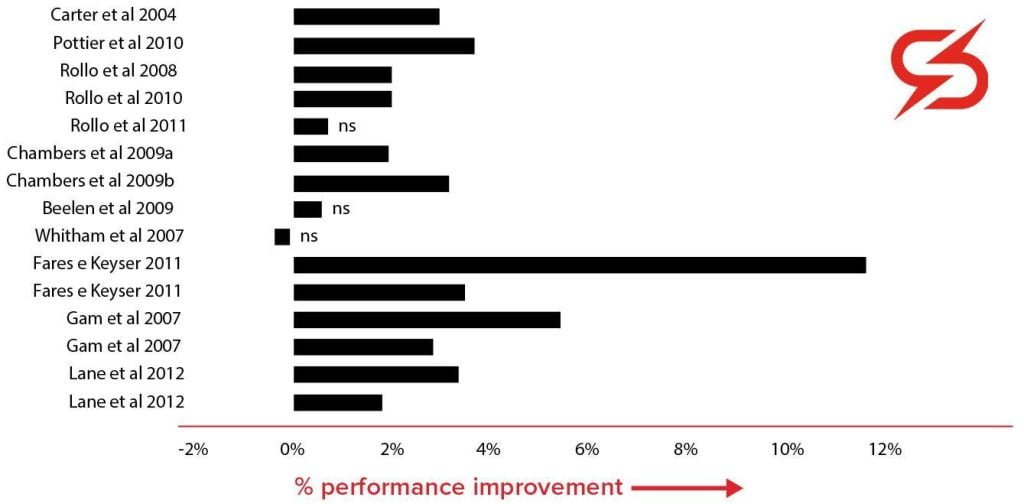
Fig. 3 The review of the main research on the topic demonstrates that the intake of carbohydrates leads to an improvement in performance during phases of constant effort. The research mostly concerns exercises lasting about an hour (many, not all) on an empty stomach.
WATER: HYDRATION IN THE COMPETITION
Preparing a bottle of mineral water only can be a suitable choice for short-term events. In long and/or hot events, sports drinks help supplement or consume carbohydrates and electrolytes at the same time. The amount of carbohydrates needed during events will depend on the distance and time needed to complete the race. For short, high-intensity events, even “mouth rinsing” alone with energy drinks can be sufficient for excellent performance. In longer events (over 90 minutes), it is recommended to consume approximately 30-60g of carbohydrates per hour to prevent muscle fatigue, maintain power and cognition. Higher amounts of carbohydrate (up to 90g/hour) can provide additional benefits at high speeds and events longer than 3 hours. Examples of usable foods: bananas, energy bars, gels or sports drinks.
HOW TO INTEGRATE INTO CYCLING WITH SPRINTADE®
There are therefore two completely opposite approaches to cycling nutrition, pre-race and supplementation. On the one hand there are skeptics who are proven wrong by facts and scientific data, on the other there are those who seek orthorexia with complex and often difficult to apply solutions.
Sprintade® was born as a supplement plan before, during and after training or competition. One or all of the products in the line can be an aid to those looking for solutions to avoid feeling exhausted (for those who don’t want to “get sick”) or with cramps. Naturally, training and correct nutrition are in the first place to obtain the desired result, aware that systematic integration makes the difference in contexts of intensive and repeated effort, from medium distances up and for those who compete or train frequently.
Short-duration events, no longer than 60′
The main objective should be hydration. 20-30′ before departure take a ATP BOOSTER 3.0 Then prepare a water bottle with ALKALINE RECOVERY to be used for normal hydration. At the end of the race, for better salt and water recovery, take ALKALINE RECOVERY together with an extra source of EAA and a handful of dried fruit (apricots, dates, raisins)
Events of medium duration, from 1 to 3 hours.
One of the primary objectives is to provide sufficient energy for the event. Prepare 2 water bottles:
- with 2 Sprintade® ALKALINE RECOVERY to hydrate any solid food, to be alternated with intake of ATP BOOSTER 3.0 and ATP BOOSTER. They will be alternated approximately every 45′.
- with 1 Sprintade® ALKALINE RECOVERY and ISOTONIC GEL.
The CHO intake target is 30 to 60 grams/hour. 20-30 minutes before departure take: Sprintade® COMPLETE ENERGY. At the end of the race, for better hydrosaline recovery, take Sprintade® ALKALINE RECOVERY together with an extra source of BCAA + proteins and a handful of dried fruit (apricots, dates, raisins)
Long-lasting events, over 3 hours.
Objectives: hydration, provide sufficient carbohydrates, avoid “food boredom”. Prepare 2 water bottles:
- with 2 ALKALINE RECOVERY to hydrate any solid food to be alternated with the intake of ATP BOOSTER 3.0 and ATP BOOSTER. They will be alternated approximately every 45′.
- with 1 Sprintade® ALKALINE RECOVERY and ISOTONIC GEL.
The target intake of CHO is 30 to 60 grams per hour.
20-30 minutes before departure take: COMPLETE ENERGY. • Before departure, take GLUTOS® sublingual glutathione. Digestion, as the event continues, may become more difficult, therefore take solid food (energy bars, dried fruit, etc…) more in the first phase of the event, then continue with energy gels. At the end of the race, for better hydrosaline recovery, take ALKALINE RECOVERY together with an extra protein and carbohydrate source such as ISOTONIC GEL.
Short-duration events, no longer than 60′
The main objective should be hydration. 20-30′ before departure take an ATP Booster 3.0. Then prepare a water bottle with ALKALINE RECOVERY to use for normal hydration. At the end of the race, for better hydrosaline recovery, take ALKALINE RECOVERY together with an extra source of EAA and a handful of dried fruit (apricots, dates, raisins)
Medium duration events, from 1 to 3h.
One of the primary objectives is to provide sufficient energy for the event. Prepare 2 water bottles:
- with 2 ALKALINE RECOVERY to hydrate any solid food to be alternated with the intake of ATP BOOSTER 3.0 and ATP BOOSTER. They will be alternated approximately every 45′.
- with 1 ALKALINE RECOVERY and Sprintade® ISOTONIC GEL.
The CHO intake target is 30 to 60 grams per hour. 20-30 minutes before departure take: Sprintade® COMPLETE ENERGY. At the end of the race, for better hydrosaline recovery, take Sprintade® ALKALINE RECOVERY together with an extra source of BCAAs + proteins and a handful of dried fruit (apricots, dates, raisins)
 13/01/24
13/01/24 8
8

